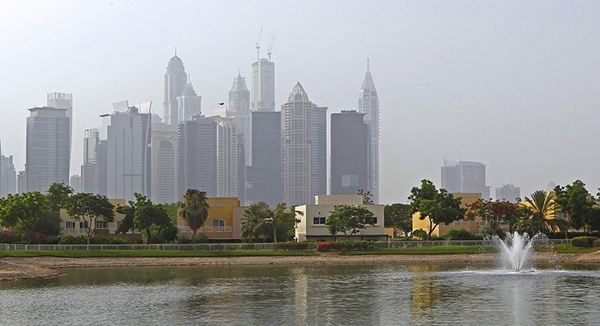Dubai Inflation Set to Ease as Housing Prices Fall
Falling rents and a strengthening dollar are forecast to ease inflationary pressures in Dubai this year, according to economists, even as the emirate’s highest annual rise in prices in nearly six years took place last month.
Dubai’s year-on-year consumer price index rose 4.51 per cent in January, the biggest increase since May 2009. The index rose 0.8 per cent last month, compared with prices at the end of December.
However the emirate’s inflation rate is expected to decrease during the course of this year, thanks to falling rents and the continuing strength of the US dollar against the euro, according to economists.
“Looking ahead, we have already seen evidence of softer residential real estate prices in Dubai,” said Khatija Haque, the head of Mena research at Emirates NBD.
“As this feeds through to the CPI [usually with a substantial time lag], we expect continued inflationary pressures from housing to ease.”
The property broker Jones Lang LaSalle last month predicted that prices and rents across Dubai would drop by an average of 10 per cent this year.
Ms Haque also noted that falling commodity prices globally would help slow inflation.
The strength of the dollar, to which the dirham is pegged, would also help to keep a lid on imported inflation, according to Alp Eke, the senior economist at National Bank of Abu Dhabi.
“Dubai is an import-based economy, with 20 to 25 per cent of household spending on imports,” he said.
“Deflation in the euro zone and the falling exchange rate against the dollar will affect households positively, pushing imported inflation down this year.”
The euro has lost 6.5 per cent of its value against the dollar so far this year.
The rise in Dubai’s January CPI was partly explained by a 5 per cent spike in the price of furnishings, household equipment and routine maintenance during January.
Housing, water and electricity, which account for 44 per cent of the overall basket used to calculate CPI, rose by 7.56 per cent year on year in January.
Food and non-alcoholic beverages, which account for 11 per cent of the basket, slipped by 1.56 per cent year-on-year in January.
Last month Statistics Centre Abu Dhabi (Scad) reported that year-on-year inflation for Abu Dhabi rose to 4.1 per cent in December.
The centre, which has not yet released figures for January, is forecasting an annual inflation rate of about 4.3 per cent for the first quarter of the year.
By John Everington| Published in The National | Feb 19, 2015
